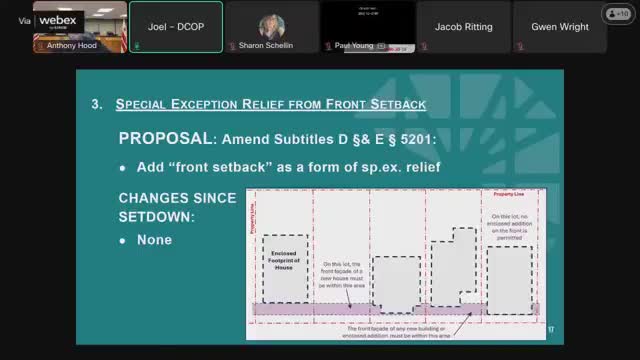Attorney general and planning staff back by‑right IZ "opt-in" in low-density zones; civic groups urge caution
Get AI-powered insights, summaries, and transcripts
Subscribe
Summary
The Office of Planning asked the Zoning Commission to allow voluntary Inclusionary Zoning (IZ) opt-ins by right in R2, R3 and RF zones, removing a special-exception requirement that staff said discourages the provision of dedicated affordable units in low-density neighborhoods.
The Office of Planning proposed making voluntary Inclusionary Zoning (IZ) opt-ins a matter of right in lower-density residential zones (R2, R3 and RF), saying the current special-exception requirement is an unreasonable barrier to producing dedicated affordable units in neighborhoods that otherwise lack them.
Mister Lawson, presenting for the Office of Planning, said the current requirement for a special exception in these zones discourages applicants because the review is lengthy and costly. "We feel that it's not appropriate to require special exception review for the provision of IZ units, particularly in the lower density residential zones where opportunities to address the provision of dedicated affordable units are fewer," Lawson said.
The Office of the Attorney General supported the change at the hearing. Noelle (OAG) testified that removing the special-exception requirement would streamline production of IZ units in higher-cost, low-density neighborhoods and free BZA capacity for cases with greater potential neighborhood impact. OAG recommended one technical conforming edit to Subtitle C (1,002.2) to remove an outdated cross-reference so the code is internally consistent.
Opponents urged caution. Meg McGuire of the Committee of 100 said the public-review function of the special-exception process matters to neighborhood character and urged the commission to retain public scrutiny for mandatory and voluntary IZ in these zones. Commissioners noted the record includes several recent cases in which special-exception review produced IZ units (vice chair cited six cases producing about 26 units across the examples), and several commissioners said they were inclined to support the change while remaining attentive to public-input concerns.
No formal vote was taken; the items remain on the omnibus case record for later deliberation.
